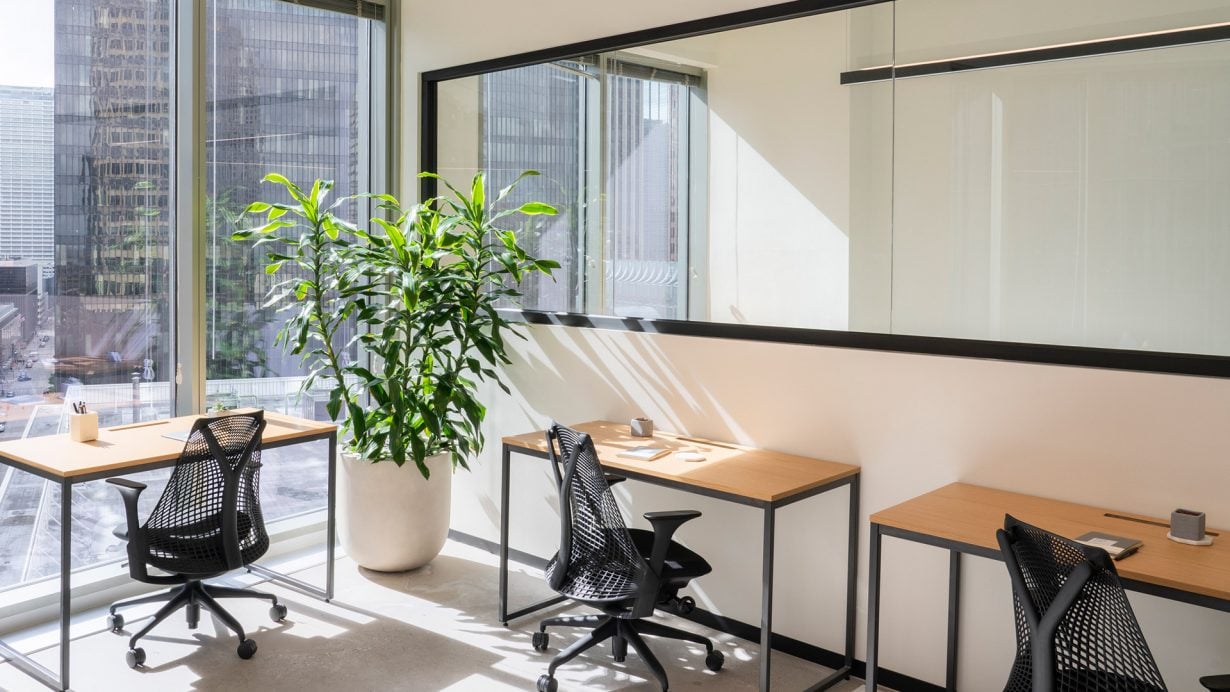Finding the right office space for small or short-term tenants
Finding the perfect office space for a client can be a challenge, especially when they represent a smaller business or they’re looking for a short-term lease.
These requests are on the rise and we don’t expect them to slow down any time soon. So, what can brokers do to find the right solution for their small or short-term lease clients?
Top challenges of finding small or short term office spaces
The five- or ten-year office leases many buildings offer aren’t suitable for a lot of nimble startups, small businesses and large enterprise firms setting up small offices in new cities. Why is that — and why would many companies of all sizes hesitate when asked to sign on the dotted line?
Future uncertainty
Planning for growth poses a challenge. A small to midsize company may outgrow their office space in only a few short years, leaving them to pack more employees into an already crowded space. Or, as more employees work from home, they may be left with more space than they need. This is where agility becomes important and signing a long-term lease may leave a company with a space that doesn’t work for them.
Some factors that may be on your client’s mind:
- How much will my business grow or shrink
- Where will my clients (and employees) be located in the future
- What kind of spaces will the company need in the future, such as communal spaces, conference rooms, or private offices
These kinds of predictions can be difficult to forecast with accuracy. Add in macroeconomic factors like real estate and housing trends, economic slowdowns, or job market tightness, and everything is thrown into question.
Limited offerings
Furthermore, many office buildings simply don’t have offerings for smaller teams. If your client won’t ever need 20,000 square feet of office space, they may feel like they can never get into a large office building.
Small private office space tends to be near the urban core, where higher rents and hard physical limitations impact a company’s ability to expand or scale. Plus, these small offices in popular neighborhoods are often very competitive for business tenants, and rising rents may force businesses to relocate when prices get too high. This is where flex workspaces in desirable locations come into play.
Extra expenses
A company that is running on tight margins doesn’t have the capital to invest in things that don’t add to the bottom line. But many company culture intangibles, such as comfortable furniture, engaging decor, and a powerful technology infrastructure, are essential for attracting competitive talent and keeping them. In these cases, a turnkey office space is a necessity.
What business tenants really want from an office building
Finding the right space for your clients is all about understanding what business leaders want in an office. For most, that doesn’t mean a nap room or an employee ping pong table. Here are some of the top considerations of tenants when picking an office space.
Flexibility — Flexibility in lease terms and size of the space create a working environment that’s more accessible to teams of all sizes and needs. It allows for adjustments when needed and even allows companies to try a space out before committing to longer terms.
Cost — Affordable spaces that are the right fit for a team — and how often they’d be using the space — are in high demand right now. No company wants to spend more on office space they aren’t using.
Location — Location, location, location. The physical location of an office impacts the kind of people a business recruits. Access to local amenities, public transit or highways, and even the neighborhood will influence who comes to work for a company. Is the office close to their employees? Is it centrally located making it easy for employees located all over the city to come into work?
Turnkey space — Costly office build-outs take weeks or months to complete, and they cut into the bottom line. Most tenants want an office that is ready to roll out at a moment’s notice. Better yet, does the building have available turnkey office spaces to cater to rapid upscaling, client meetings, or special events? That is a big bonus.
Responsiveness — Most operations teams have enough to worry about without following up on HVAC repairs for the third time. Is the building staff responsive to fixing issues quickly and communicating frequently? Your client wants to focus on their business, not their building.
Amenities — Does the office building provide amenities that cover the needs of the business and their employees? Are there amenities that are private and shared? For example, a health-conscious startup may want more bike parking, many will be looking for fresh coffee throughout the day, and some may need private meeting rooms or kitchenettes.
High-quality property management — A business tenant is more than a tenant-landlord interaction, it’s a client relationship. Does the property manager hold up their end of the bargain by being responsive, courteous, and diligent about quality-of-life factors like cleanliness?
Matching tenant mix — Does the current tenant landscape match the client’s team and do they create an atmosphere that their team would be proud of and comfortable working in?
Conclusion
Finding a small and flexible office space for your client may be challenging, but fortunately, it’s not impossible. The Square covers all of the bases above and can be a good fit for your Houston-based clients.
Matched with Hines’ trusted services, the affordability of flexible office space, and the convenience of a location in downtown Houston, you can check all the boxes for your clients.
Find the right office space for your Houston business clients. Chat with us or book a tour.
